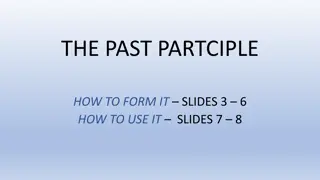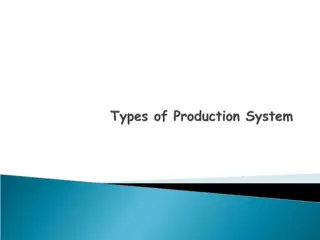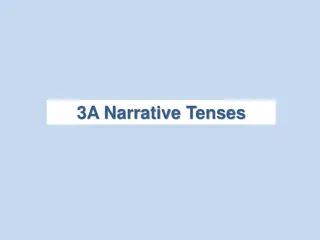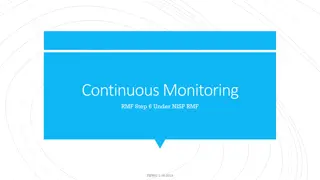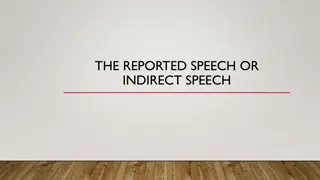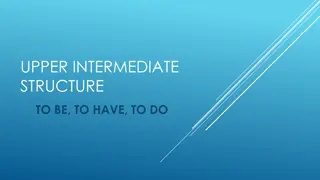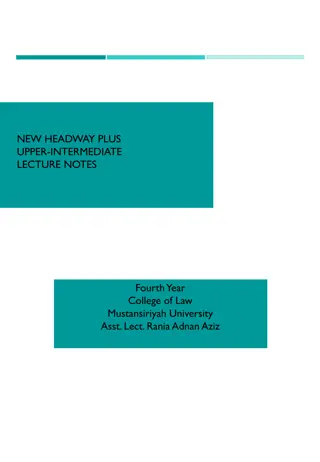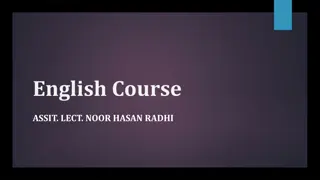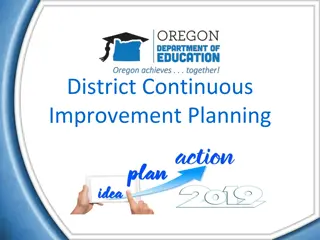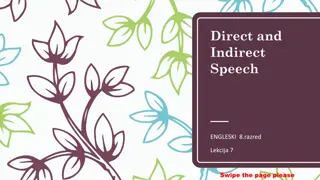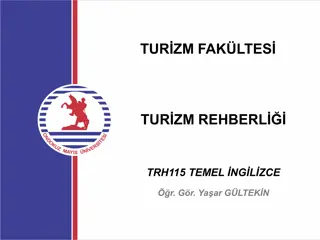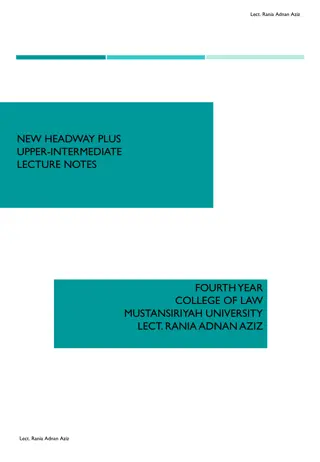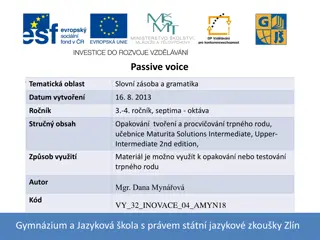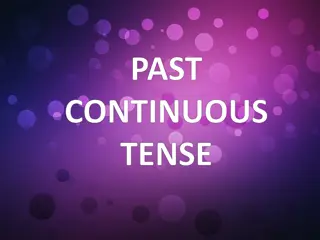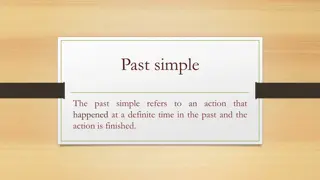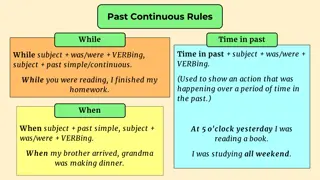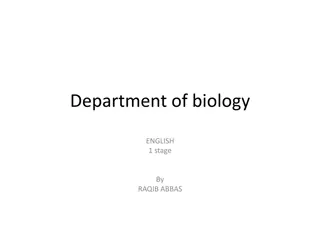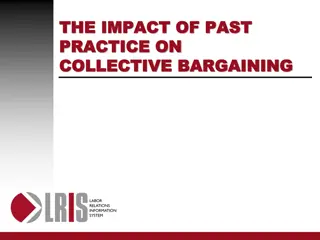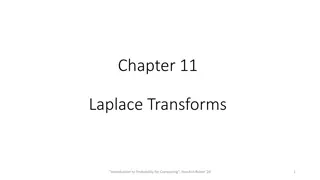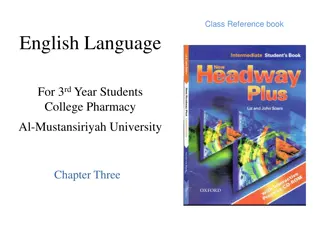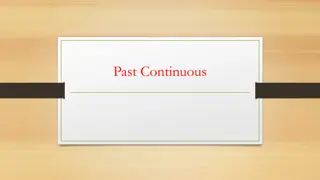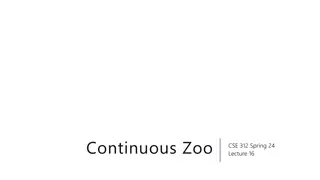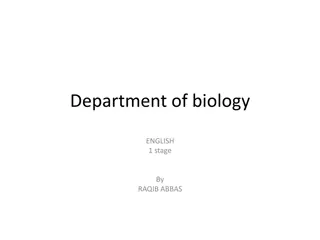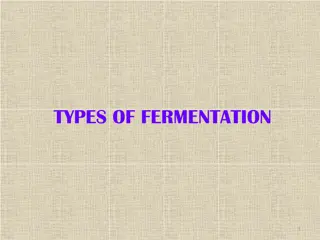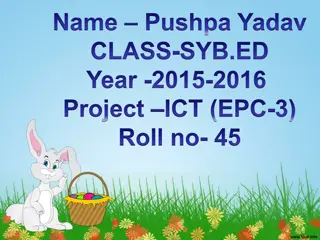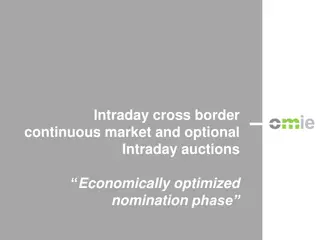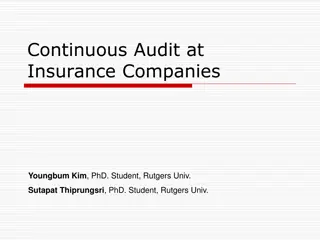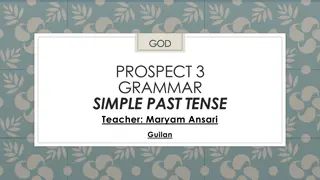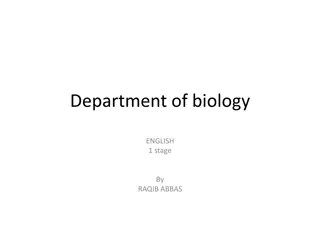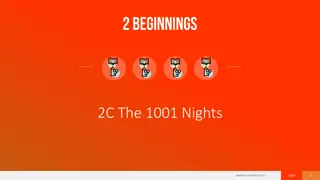Understanding Verb Forms and Tenses in English
Explore the different verb forms and tenses in English, including past, present, and future, as well as simple, continuous, perfect, and perfect continuous aspects. Learn how to use verb forms to create various tenses and understand when to use present, past, or future tense in different contexts.
4 views • 21 slides
Learn Past Continuous Tense - Grade 6 English Lesson
This Grade 6 English lesson focuses on understanding and correctly using the past continuous tense. It covers the rules for forming the past continuous tense, examples of its usage, and an assessment to test comprehension. Students will practice talking about actions happening at specific times in t
4 views • 6 slides
Europe Continuous Bioprocessing Market
The Europe Continuous Bioprocessing Market is expected to grow at a CAGR of 19.1% from 2023 to 2030 to reach $206.1 million by 2030. Continuous manufacturing is an emerging trend spanning various industries. From automotive to paper, businesses are embracing continuous manufacturing to enhance effic
3 views • 2 slides
Learning Past Continuous Tense with Pronouns and Forming Questions
Explore how to use pronouns with "was" and "were" in the past continuous tense through examples and practice sentences. Learn to form questions using the past continuous tense and develop an understanding of when to use "was" or "were" with different subjects. Improve your grammar skills with this l
9 views • 15 slides
DevOps Certifications and the Rise of Continuous Learning in IT
The rise of DevOps certifications and the emphasis on continuous learning are reshaping the IT landscape. As organizations strive for greater efficiency and innovation, the demand for skilled DevOps professionals will continue to grow. By embracing continuous learning and obtaining relevant certific
0 views • 8 slides
Mastering the Past Participle in English Verbs
Understand how to form and use the past participle in English verbs, both regular and irregular. Learn the rules for forming regular past participles, including when to double consonants and when to change 'y' to 'i'. Discover examples of irregular verbs and how their past participles are formed. Ex
0 views • 8 slides
Understanding Types of Production Systems: Intermittent vs. Continuous
Types of production systems are categorized into Intermittent Production System and Continuous Production System. In Intermittent Production, goods are produced based on customer orders in a flexible and non-continuous manner, allowing for a variety of products. Examples include goldsmiths making or
10 views • 17 slides
Understanding Past Tenses in Narratives
Exploring the use of past simple, past continuous, past perfect, and past perfect continuous tenses in narratives with examples and explanations. Learn how to convey different past events and their relationships in storytelling.
1 views • 4 slides
Understanding Continuous Monitoring in Risk Management Framework (RMF)
Explore the continuous monitoring process in the Risk Management Framework (RMF) under the NISP RMF FISWG. Learn about the six steps in the RMF process, DSS-provided RMF guidance, and an overview of RMF continuous monitoring strategies and security control families. Discover how to outline DSS RMF p
1 views • 25 slides
Mastering Reported Speech: Simple Present to Simple Past
Learn how to convert statements from the simple present tense to the simple past tense in reported speech with clear examples. Practice exercises are provided for better understanding, covering various sentence structures including negative sentences and present continuous to past continuous transfo
0 views • 45 slides
English Verb Structure Practice
Practice identifying subjects and verbs in sentences featuring the structure of "to be," "to have," and "to do." Learn about verb tenses, including present continuous, past continuous, present perfect, and past perfect. Explore the correct usage of "have," "has," and "had" as both full verbs and aux
0 views • 12 slides
Understanding the Present Perfect Tense in English Grammar
The lecture notes explore the Present Perfect tense, highlighting its connection between past actions and their relevance in the present. It compares the Past and Present Perfect tenses, discussing the nuanced differences and providing examples for clarity. The document covers the usage of the Prese
0 views • 8 slides
Understanding the Past Perfect Tense in English Grammar
The Past Perfect Tense is used to talk about actions completed before a certain point in the past, emphasizing the sequence of events. This tense follows the structure of "had + past participle" and is crucial for expressing events that happened earlier than others in a narrative. Knowing how to for
0 views • 27 slides
Oregon District Continuous Improvement Planning Process
Explore the key components of Oregon's district continuous improvement planning process, including objectives, executive memos, ODE commitments, and the essential elements that all Oregon districts must incorporate into their continuous improvement plans. Learn about the shifts in the overarching vi
0 views • 9 slides
Learn Direct and Indirect Speech in English: Grade 8 Lesson 7
Explore the transformation from direct to indirect speech in various tenses such as Simple Present, Present Continuous, Simple Past, Past Continuous, and Simple Future. Understand the changes in verbs and adverbs of time and place. Practice exercises to enhance your understanding.
0 views • 28 slides
Understanding Simple Past Tense in English: Rules and Examples
The simple past tense is a fundamental form in Modern English used to describe past events. It involves regular verbs adding "-ed" and irregular verbs having different forms. The construction of the simple past helps distinguish it from other past tense forms like past perfect and past progressive.
0 views • 33 slides
Understanding Narrative Tenses: Past Simple, Present Perfect, and Past Continuous
Explore the nuances of narrative tenses through detailed lecture notes by Lecturer Rania Adnan Aziz. Learn the differences between Past Simple and Present Perfect, grasp the usage of Past Continuous, and understand the significance of Past Perfect in expressing past actions and timelines. Dive into
0 views • 6 slides
Understanding the Past Perfect Tense in English Grammar
The past perfect tense expresses actions that occurred before another action in the past, referring to time up to a point in the past. It is often used in reported speech and formal writing to indicate completed actions before a specific event. The past perfect progressive tense emphasizes the durat
0 views • 15 slides
Understanding Verb Tenses: Present Perfect and Past Perfect Forms
Explore the usage of present perfect and past perfect verb forms to indicate relationships of time and cause. Present perfect verbs denote actions with undefined past timing but relevance to the present, while past perfect verbs describe events that occurred before another past event. Examples and e
0 views • 7 slides
Understanding Tenses: Present, Past, and Future - Learning Outcomes and Examples
Explore the concept of tenses through images and explanations. Learn about present, past, and future tenses, along with their classifications such as indefinite, continuous, perfect, and perfect continuous. Understand how to identify different types of actions in sentences based on tenses and improv
0 views • 30 slides
Understanding Passive Voice: Rules and Examples
Passive voice is a grammatical construction used when the focus is on the action itself rather than the doer. It is formed by combining a form of "to be" with the past participle of a verb. This content explores the usage of passive voice in different tenses - present simple, present continuous, pas
0 views • 14 slides
Understanding the Past Continuous Tense
The Past Continuous Tense is used to describe interrupted activities that continued for a period in the past or things happening continuously in the past. Learn how to form affirmative, interrogative, and negative sentences in this tense with examples and images.
0 views • 12 slides
Understanding the Past Simple Tense in English Grammar
The past simple tense refers to actions that occurred at a specific time in the past and are now completed. This tense follows a specific rule where the subject is combined with a verb (regular or irregular) and a complement. Adverbs like "yesterday," "ago," and "last" are commonly used with past si
0 views • 9 slides
Past Continuous Rules and Practice
Learn about the rules of using the past continuous tense with examples, fill-in-the-blank exercises, and questions related to a video from "Up." Dive into discussions about past activities and multitasking. Explore the lyrics from "Encanto" for more practice.
4 views • 7 slides
Understanding Past Simple Tense in English Grammar
The past simple tense is used to describe completed actions or events that happened at a specific time in the past. Regular verbs form the past simple by adding "-ed", while irregular verbs have unique past tense forms. The structure for negative and question forms involves the auxiliary verb "did".
0 views • 6 slides
Understanding the Impact of Past Practices on Collective Bargaining
Exploring the significance of past practices in interpreting, supplementing, and potentially contradicting contract language within the context of collective bargaining. Covering topics such as the definition of past practices, the duty to bargain, waivers of protest rights, and remedies for unlawfu
0 views • 35 slides
Understanding Laplace Transforms for Continuous Random Variables
The Laplace transform is introduced as a generating function for common continuous random variables, complementing the z-transform for discrete ones. By using the Laplace transform, complex evaluations become simplified, making it easy to analyze different types of transforms. The transform of a con
0 views • 17 slides
Understanding Past Tenses in English for 3rd Year College Pharmacy Students
Dive into the intricacies of past tenses in English as you explore the nuances between past simple, past continuous, past perfect, and more. Test your grammar skills while learning to express events that occurred in the past, with a focus on practical application for students at Al-Mustansiriyah Uni
0 views • 25 slides
Learn Past Continuous Tense Through Examples
Explore the past continuous tense through examples including formation, negative sentences, questions, and exercises. Understand how to use "was/were" with verbs ending in -ing. Practice with exercises to enhance your understanding of this verb tense.
0 views • 6 slides
Grammar Revision Exercises for 7th Grade English Test
Practice simple past and past continuous tenses with exercises combining sentences, answering questions, and transforming sentences. Learn to use "while" and "when" correctly in context. Test your skills with negative and interrogative forms of past continuous sentences. Check the answers to assess
0 views • 7 slides
Understanding Probability Density Functions for Continuous Random Variables
Probability density functions (PDFs) are introduced for continuous random variables to represent the likelihood of events in a continuous space. Unlike discrete probability mass functions, PDFs operate with integration instead of summation, ensuring total probability is 1. Consistency and differenti
1 views • 32 slides
Understanding Past Perfect Tense in English Grammar
Past Perfect Tense is used to denote actions that were completed before another action occurred in the past. It is formed using the auxiliary verb "had" followed by a past participle. Examples of affirmative, negative, and question forms are provided to illustrate usage. The tense helps in sequencin
0 views • 4 slides
Overview of Different Types of Fermentation Processes
Explore the various types of fermentation processes including batch fermentation, fed-batch fermentation, continuous fermentation, solid-state fermentation, anaerobic fermentation, and aerobic fermentation. Each process has its own advantages and disadvantages, influencing factors such as sterilizat
0 views • 18 slides
Common Regular Verbs and Their Past Tenses
Common regular verbs and their past tenses are essential aspects of grammar learning. Past tense forms of verbs are used to indicate actions or states that have already occurred. Examples of regular verbs and their corresponding past tenses are provided in this content, along with spelling rules for
0 views • 17 slides
Coexistence of Continuous Cross-Border Intraday Markets and Implicit Auctions
Intraday cross-border continuous markets combine continuous trading with optional intraday auctions, providing participants with opportunities to trade firm energy within price areas. The coexistence of continuous trading and implicit auctions offers advantages such as market price acquisitions and
0 views • 9 slides
Continuous Audit at Insurance Companies
Creating a rule-based model for anomaly detection, this research focuses on developing an architecture for continuous audit systems. By utilizing historical data, the scope includes detecting fraud, discrepancies, and internal control weaknesses, leading to a maturity model for automated continuous
0 views • 27 slides
Understanding Simple Past Tense in Grammar
In this file, we delve into the concept of simple past tense in grammar. Through examples and explanations, you will learn how to use the simple past tense to talk about completed actions in the past. The structure, usage, and importance of simple past tense are covered extensively to enhance your u
0 views • 30 slides
Understanding the Past Continuous Tense in English Grammar
Past Continuous Tense is used to describe ongoing actions in the past. It is formed with "was/were" + present participle (-ing). Learn its structure, usage, negation, and questioning forms with examples. Enhance your English grammar skills by mastering the Past Continuous Tense.
0 views • 4 slides
English Grammar Practice Exercises and Learning Materials
This content provides a series of English grammar practice exercises focusing on past simple and past continuous tenses. It covers topics such as forming positive, negative, and questions in the past tense, usage of conjunctions like because, so, until, when, and while, along with image references f
0 views • 10 slides
Utilizing Present Continuous & Verb 'Can' in English Grammar Lessons
In this English grammar lesson, students learn to use the present continuous tense for activities happening at the moment or future plans. They also understand the usage of 'can' for expressing ability positively or negatively. The rules for forming present continuous verbs and examples are provided
0 views • 9 slides





